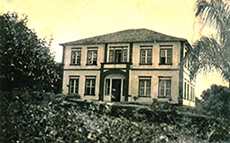About UFLA
Location
Check out UFLA’S map, locate the physical structures and know how to get to the city.
Institutional Mission
Maintain and promote excellence in teaching, research, and extension, producing and disseminating high-quality scientific and technological knowledge in society, contributing to the formation of creative, competent, critically reflective individuals and professionals committed to ethics for a more just and democratic society.
Vision
Be a national and international reference as a socially and environmentally responsible university, integrated into society, as a center of excellence in academic, scientific, technological, and cultural production.
Values
- Autonomy
- Universality
- Excellence
- Ethics
- Sustainability
- Transparency
- Health and life quality
- Teamwork
- Social Commitment
Get to know a little about UFLA
The UFLA campus offers a wide range of support facilities, including student accommodation, a multi-sports gymnasium, courts, and a football stadium, a university restaurant, snack bars, a community center, a university integration center with infrastructure for sports and leisure, a convention center, post offices, banks, consumer and work cooperatives, a hotel, a training center, an automated language laboratory, radio and TV stations linked to the educational system, a publishing house, printing services, a bookstore, and two supporting foundations for the institution: the Foundation for Support of Teaching, Research, and Extension (Faepe) and the Foundation for Scientific and Cultural
Development (Fundecc).
The organization of UFLA's space is being strategically planned to accommodate the University of the future. Currently, actions are being developed that include an environmental and infrastructure plan, designed to accommodate the rapid growth that the university is experiencing - actions that are of utmost importance for the development of Teaching, Research, and Extension activities, as well as for the overall experience within the university.
The entire process of restructuring and expanding higher education at UFLA has been accompanied by the expansion of human resources, infrastructure adequacy, renewal of pedagogical practices, and convergence of extension, postgraduate, research, and student assistance actions.
History

Founded in 1908 under the motto of the Gammon Institute ("Dedicated to the glory of God and Human Progress''), the Agricultural School of Lavras became known as the Higher School of Agriculture of Lavras (ESAL) in 1938. Federalization occurred in 1963. It was in 1994 that the institution became a university, now known as the Federal University of Lavras (UFLA). This trajectory began with the realization of the ideals of its founder, Dr. Samuel Rhea Gammon, and its first director, Dr. Benjamim Harris Hunnicutt.
In its century of existence, UFLA has consolidated itself through its pioneering work in extension - it promoted the First National Corn Exhibition and the First Agricultural Exhibition in the State of Minas Gerais, introduced the first aerial silo for grain storage in the state, and also one of the first tractors to plow Brazilian lands. Through its extraordinary generation of scientific and technological knowledge, it published the first magazine in Minas Gerais aimed at rural producers. It made its mark on the national scene also for the quality of its students' education, who, as the main reason for the institution's existence, have become important actors in the recognized excellence of the University over the years.
UFLA not only has been able to make history over time but, above all, to prepare itself to effectively fulfill its social role in teaching, research, extension, and provision of services in one of the most strategic areas for the entire nation - the field of Agricultural Sciences - which, among other important aspects, deals with the production of food, wood, fibers, medicines, and renewable energy, always facing the challenge of exploring natural resources in harmony with environmental preservation. The University is prepared for its continued and effective action in such a vital area for Brazil because, in addition to being based on solid foundations, it presents the availability of the most important means for success.
Currently, the institution is committed to its integration into different fields of knowledge, challenging itself to structure new courses that are recognized for the same quality that marked its centennial history. With the recent opening of courses such as Pedagogy, Medicine, and Engineering (Civil, Chemical, Mechanical, and Materials), UFLA continues its project of strengthening and consolidating also in the areas of exact sciences, humanities, and health sciences.